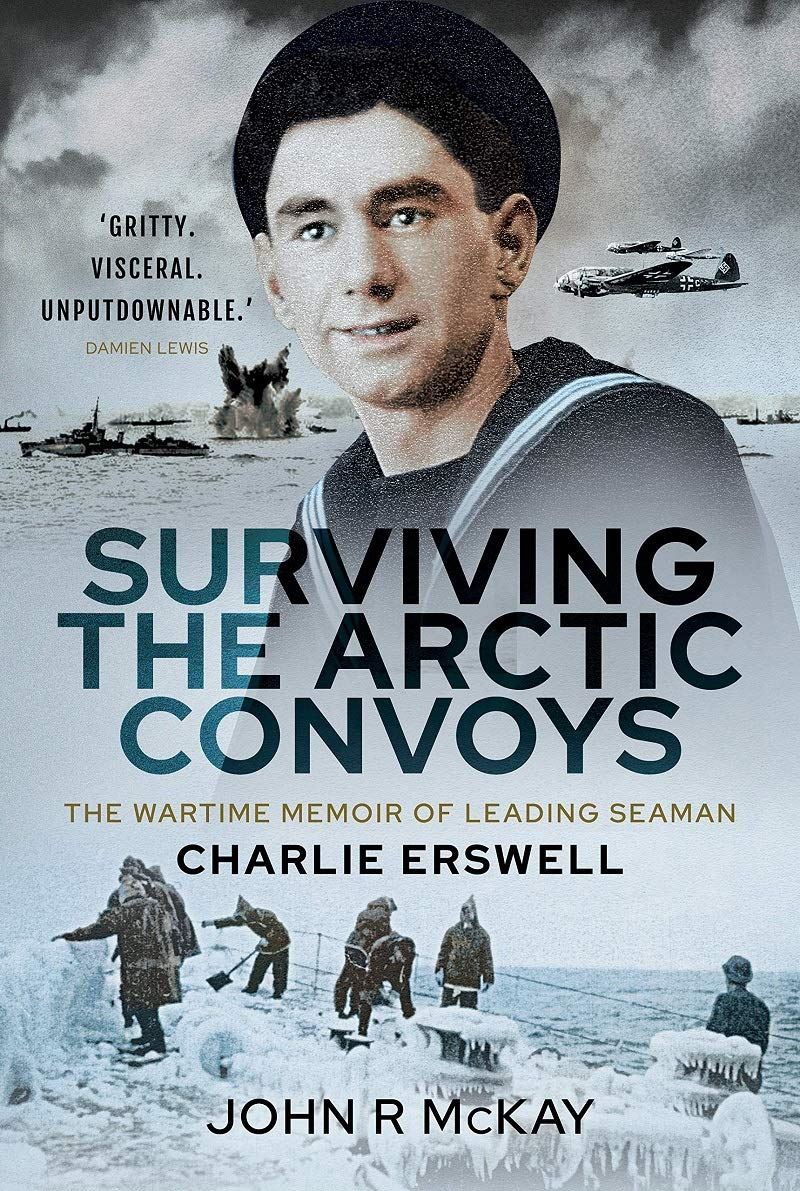Surviving the Arctic Convoys: The Wartime Memoir of Leading Seaman Charlie Erswell
Edited by John R. McKay
 The theaters of are numerous and unique, with many being notorious for both their environments and the events that occurred. One area of interest that often escapes the public eye is that of the Arctic convoys, a chapter of World War II that is fraught with peril consisting of air raids, U-boat attacks, perilous living conditions, and much more grief.
The theaters of are numerous and unique, with many being notorious for both their environments and the events that occurred. One area of interest that often escapes the public eye is that of the Arctic convoys, a chapter of World War II that is fraught with peril consisting of air raids, U-boat attacks, perilous living conditions, and much more grief.
John R McKay makes a dedicated and thorough contribution to WWII research by bringing to light this part of the war through discussion of the stories of Charlie Erswell, who predominately served in this part of the war. Aside from needed narrative exposition, McKay focuses on Charlie Erswell’s accounts, consisting of his early life, entry into the Navy, and most notable are the tales of his service during the war. This book shows a great deal about the Artic theatre of this worldwide conflict through the point of view of one sailor, and in doing so shows how the Arctic Convoys are integral to many facets of the war and worthy of being included in discussion alongside other major sections of history from this war.
In writing this thoughtful piece narrative of Charlie Erswell’s experiences, McKay creates a flowing yet comprehensive view of multiple chapters of WWII, portrayed with an obvious emphasis on the convoys and their battles whilst dealing with Arctic conditions. Starting off, aside from a brief glimpse into what was coming later in Erswell’s life, his early life and fascination with the sea and maritime ways of life were described. This leads the way for him to want to join the Royal Navy, which he does after the start of the war. Following training, he is soon put on HMS Milne wherein the large focus of this book takes place; the Kola runs. This entailed a convoy traveling to Russia to deliver a wide assortment of supplies, munitions, and other warfare materials. Due to the importance these convoys held to both sides of the war, many parts of these journeys were fraught with attacks from German U-boats, as well as aerial attacks from the Luftwaffe. McKay describes Erswell’s life during these convoys as a gun layer, protecting merchant vessels by fending off German attacks. Accounts following the Kola runs are given, both to provide a holistic narrative towards this sailor’s story as well as progressing how the war commenced with connotations surrounding the importance of these convoys.
With the immense detail that is included, historians of World War II as well as the public would find great pleasure and insight from this work. Excellent writing techniques are employed, alternating between first person accounts and general exposition. The Arctic theater of the war is explicitly shown to be a contributor to Russia’s warfare resources, which in turn assisted in the overall Allied efforts. With the emphasis of importance given to the convoys alongside the utilization of Charlie Erswell’s accounts, this work adds an impactful addition of World War II writing due to its intense and in-depth description of a theatre of war this is so often left behind others.
- Barnsley: Pen & Sword Maritime, 2021
- 6-1/4” x 9-1/2”, hardcover, xv + 181 pages
- Photographs, maps. $39.95
- ISBN: 9781399013031
Reviewed by: Dominic A. Fargnoli, East Carolina University
